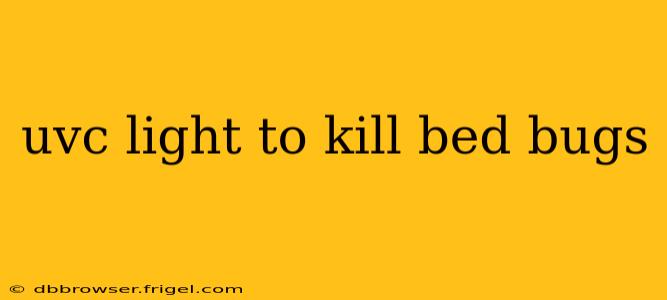Bed bugs are tiny, nocturnal insects that feed on human blood, causing itchy welts and sleepless nights. While various methods exist to eliminate these pests, UVC light has emerged as a potential solution. This guide explores the effectiveness of UVC light in killing bed bugs, addressing common questions and concerns.
Does UVC Light Kill Bed Bugs?
Yes, UVC light can kill bed bugs, but it's crucial to understand its limitations and how to use it effectively. UVC light, a short-wavelength ultraviolet light, damages the DNA of microorganisms and insects, leading to their death. Direct exposure to UVC light can effectively kill bed bugs, including eggs and nymphs. However, it's not a standalone solution and requires careful application.
How Effective is UVC Light Against Bed Bugs?
The effectiveness of UVC light against bed bugs depends on several factors:
- Intensity of the UVC light: Higher intensity lamps are more effective at killing bed bugs.
- Exposure time: Bed bugs need sufficient exposure to UVC light to be killed. Shorter exposure times may only stun or partially kill them.
- Distance from the light source: The closer the bed bugs are to the light source, the more effective the treatment will be.
- Coverage: UVC light must directly reach all infested areas. Hidden bed bugs may survive.
- Type of surface: The surface material can affect the effectiveness of UVC light. Some materials absorb the light, reducing its effectiveness.
While UVC light can be a useful tool in bed bug control, it is rarely 100% effective on its own. It is most effective when used in conjunction with other treatments.
What are the Benefits of Using UVC Light for Bed Bug Control?
- Chemical-free: UVC light is a chemical-free method, making it a safer option for those concerned about using pesticides.
- Effective against eggs: UVC light can kill bed bug eggs, which are often resistant to other treatments.
- Targeted application: UVC light can be targeted to specific areas, minimizing exposure to humans and pets.
What are the Limitations of Using UVC Light for Bed Bug Control?
- Limited penetration: UVC light does not penetrate deeply into materials, so it may not reach bed bugs hiding deep within cracks and crevices.
- Requires direct contact: Bed bugs need direct exposure to the UVC light to be killed.
- Not a complete solution: UVC light is most effective when used as part of a broader integrated pest management (IPM) strategy.
- Safety concerns: UVC light can be harmful to human skin and eyes, so proper safety precautions must be taken.
Can UVC Light Kill Bed Bug Eggs?
Yes, UVC light can kill bed bug eggs, although they may require longer exposure times than adult bed bugs due to their protective shell.
Is UVC Light Safe for Humans and Pets?
UVC light can be harmful to human skin and eyes, causing sunburn and eye damage. It's crucial to use UVC lamps responsibly, following all safety instructions provided by the manufacturer. Keep humans and pets out of the area while the UVC light is operating. Never look directly at the UVC light.
How to Use UVC Light to Kill Bed Bugs Effectively?
Using UVC light effectively requires a strategic approach:
- Identify infested areas: Thoroughly inspect your home to locate all infested areas.
- Prepare the area: Remove any items that could be damaged by UVC light, and cover exposed skin.
- Apply UVC light: Direct the UVC light towards infested areas, ensuring all surfaces are exposed. Pay special attention to cracks, crevices, and seams where bed bugs may be hiding.
- Follow safety precautions: Wear appropriate protective gear, such as UVC-blocking eyewear and gloves.
- Repeat treatments: Multiple treatments may be necessary to achieve complete eradication. Combine with other methods for optimal results.
What other methods should be used with UVC light to control bed bugs?
UVC light is best used as part of a comprehensive bed bug control strategy that includes:
- Thorough cleaning: Vacuuming and steam cleaning infested areas.
- Encasement: Encasing mattresses and box springs in zippered encasements.
- Heat treatment: Using professional heat treatments to kill bed bugs in all life stages.
- Professional pest control: Contacting a qualified pest control professional for effective treatment and monitoring.
By understanding the capabilities and limitations of UVC light, and by combining its use with other effective methods, you can significantly improve your chances of successfully eliminating a bed bug infestation. Remember, prevention is key; regular cleaning and inspection can help prevent future infestations.
